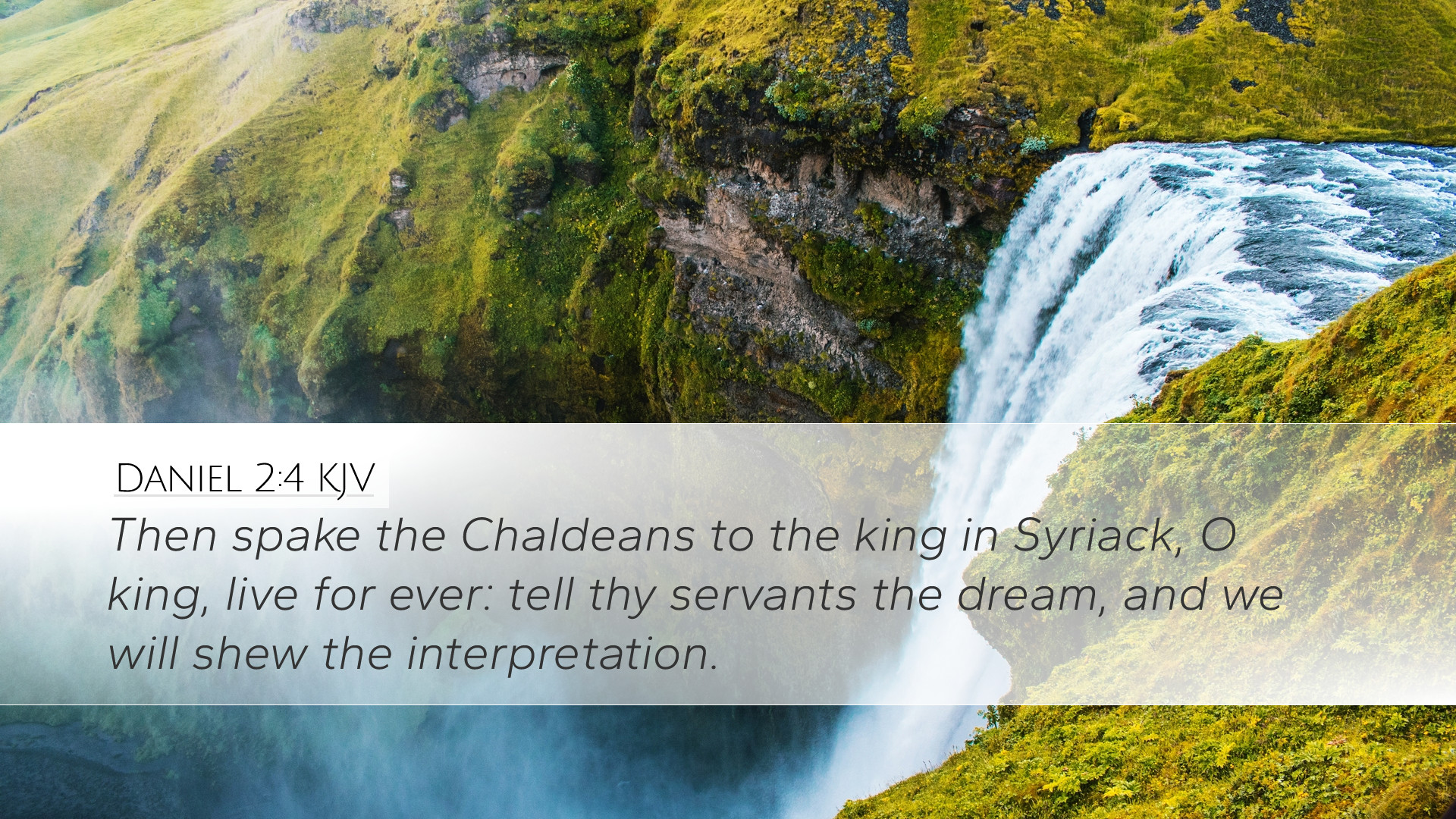Commentary on Daniel 2:4
Verse Context: Daniel 2:4 marks the beginning of the significant narrative concerning Nebuchadnezzar's dream. This moment introduces us to a critical juncture in the Book of Daniel, bridging the gap between the Babylonian environment and the divine wisdom that Daniel embodies.
Interpretation and Divine Revelation
Matthew Henry's Commentary: Matthew Henry emphasizes the importance of divine revelation in the text. He notes that when the Chaldeans begin to speak to the king, they are not merely serving as advisors; rather, they are participants in a dialogue between human authority and divine sovereignty. This moment reveals the limitations of human wisdom in contrast to divine insight.
Henry points out that the Chaldeans' attempts to interpret the dream highlight the futility of relying solely on human reasoning when confronted with the mysteries of God. Their utterances serve as a stark reminder that true understanding comes only from God, a theme that resonates throughout the Book of Daniel.
The Role of Language and Communication
Albert Barnes' Notes: Albert Barnes focuses on the role of language in this dialogue. He notes that the Aramaic phrase used here, “Tell thy servants the dream,” underscores a significant cultural context. This language choice indicates a shift from Hebrew to Aramaic, suggesting a broader theme concerning the inclusiveness of God's message beyond the Jewish people, as Aramaic was the language of the Babylonian empire.
- This transition marks the beginning of a section of the book where God’s sovereignty is revealed not just to Israel but to world powers.
- Barnes underscores that Nebuchadnezzar wishes to prove the wisdom of his advisors, illustrating the often precarious relationship between rulers and their counselors.
Human Limitations vs Divine Wisdom
Adam Clarke's Commentary: Adam Clarke elaborates on the theme of human limitations in understanding divine mysteries. He considers Nebuchadnezzar's demand for the interpretation of the dream without revealing its content as a test of wisdom.
Clarke explains that the king's request serves to expose the inadequacy of his advisors. They are put in a position where they must either reveal the content of the dream through their own wisdom or face dire consequences. This situation symbolizes the greater truth that ultimately, all human wisdom pales in comparison to the knowledge of God.
Lessons for Pastors and Theologians
When reflecting on Daniel 2:4, there are several vital lessons for pastors and theologians:
- The Importance of Divine Guidance: Leaders and individuals within the church should seek God's guidance in decision-making, echoing the truth that human wisdom is inherently limited.
- The Need for Humility: Like Nebuchadnezzar’s advisors, church leaders often face situations beyond their understanding; humility before God and reliance on prayer is essential.
- Understanding Cultural Context: The use of language in the narrative illustrates the need for understanding cultural contexts in biblical interpretation, leading to greater inclusivity and broader application in ministry.
Conclusion
In summary, Daniel 2:4 serves as a critical reminder of the need for divine wisdom amidst human affairs. The interplay between the spiritual and the secular, illustrated through Nebuchadnezzar's dream and the subsequent responses, challenges modern readers to reflect on the nature of wisdom and the necessity of seeking God’s counsel in all matters.
This passage invites deeper exploration into the character of God as the ultimate source of knowledge and prompts an awareness of the human condition, encouraging a posture of readiness to receive divine revelation in our lives and ministries.


